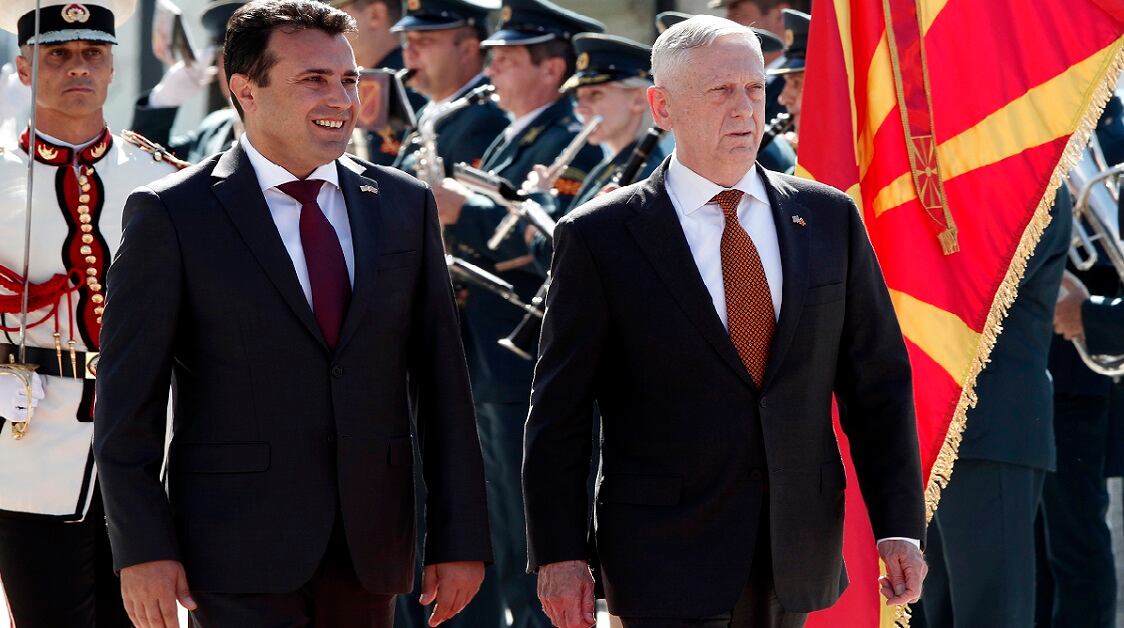WASHINGTON — The newly christened North Macedonia is pushing for allied nations to vote on its ascension to NATO as quickly as six months from now, as leadership seeks to finish that agreement before Russia can find ways to scuttle it.
Speaking to reporters in Washington, Bujar Osmani, Macedonia’s deputy prime minister in charge of European affairs, warned that “every single day more left to the process gives a day more for those who want to hijack the process and those adversaries that would like to compromise” Macedonia’s plans to join NATO.
“I think we got the last train. This region of the world, geopolitically, is becoming very dynamic, and I think it was the last [chance] for us to define the geopolitics in the region, that this region belongs to NATO, belongs the Euro-Atlantic family of countries,” Osmani said. “We should not consider the process over until it is over, and we should put it on the fast-track procedure so the ratification should be finalized as soon as possible.”
RELATED

Osmani has reason to suspect Russia will attempt to scuttle his country’s chance of joining NATO. NATO nations have identified Russia as attempting to influence a vital referendum vote in October last year, with then-U.S. Defense Secretary Jim Mattis saying the U.S. was aiding in resistance to a cyber campaign.
And in 2017, just before Montenegro was set to join NATO, a coup plot was broken up by local police; Western intelligence sources identified the plot, which would allegedly have included political assassinations and would purportedly have been funded and organized by Moscow.
Greece has held up Macedonia’s requests to join NATO and the European Union for decades, as part of a demand that its northern neighbor change or modify its name to avoid any claim to the territory and ancient heritage of the region in northern Greece named Macedonia — birthplace of ancient warrior king Alexander the Great.
An agreement, reached last year and surviving a number of votes in both nations, saw Macedonia change its name to North Macedonia. In exchange, Greece has agreed to end its objections to Macedonia joining both NATO and the EU.
To join NATO, the governing bodies of the 29 allies must ratify Macedonia’s ascension. Osmani doesn’t see any issue with the local governments, but is cognizant that the longer the process drags on, the greater the chance Russia could influence the outcome.
“They will try to use also the implementation of the agreement as a fertile ground for creating a negative energy between [Greece and Macedonia] because in the agreement you have different dynamics of the implementation,” Osmani said. “If you create small negative energy in different aspects of the implementation, then you can use this to get rid of the process; and also, an attempt to influence some member states.”
Hence, he wants to see a vote happen quickly within six months. That’s an ambitious timeline, given the last three countries to join NATO — Albania, Croatia and Montenegro — took 12-18 months to line up votes.
Strategically, Macedonia is hoping to get the U.S. Senate to vote in favor as soon as possible, as that would be a strong signal to other NATO members. And while President Donald Trump has been vocally critical of NATO at times, the Senate has been supportive, including a 97-2 vote last summer to ratify support for the alliance.
Macedonia, which now spends about 1.2 percent of its gross domestic product on defense, has a plan in place to hit the NATO target of 2 percent by 2024.
Aaron Mehta was deputy editor and senior Pentagon correspondent for Defense News, covering policy, strategy and acquisition at the highest levels of the Defense Department and its international partners.








